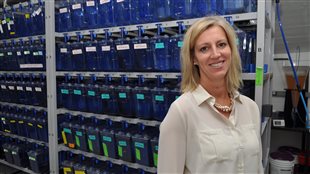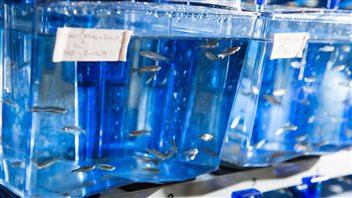Recent studies have led to concerns about a common chemical found in a wide variety of consumer products and its affect upon foetuses and growing children. As a result of that information Bisphenol A- used to harden plastics, and as a liner inside tinned food products- has been banned in some baby products.
A new study in the western province of Alberta has revealed that even miniscule doses can have a negative effect upon developing brains.
Lead researcher Deborah Kurrasch PhD is a scientist with the Alberta Children’s Hospital Research Institute, and a professor in the Department of Medical Genetics and the University of Calgary
Listen
When Bisphenol-A (BPA)was determined to be a health hazard to developing children, some manufacturers switched to another chemical, Bisphenol-S (BPS).
Professor Kurrasch is a developmental neuroscientist studies how changes in the brain in early life can impact later life.
Her research shows that the replacement BPS is just as bad as the original, and that they have a detrimental effect on brain development even at miniscule amounts, far below the levels set by the Canadian government as being safe.
The findings are published in the Proceedings of the National Academy of Sciences.
Although BPA had some known negative effects, she wanted to find out how the chemicals affect brain development
Professor Kurrasch tested exposure to the chemicals on embryonic zebrafish in very minute quantities, equivalent to that found the nearby Oldman River which supplies drinking water to the city of Lethbridge, Alberta.
She says although fish and humans are very different, the way brains develop is in fact very similar, whether fish, mice, or humans.

They found that very low doses – “1,000 fold lower than the accepted human daily exposure” of BPA – lead to overproduction of neural cells in the hypothalamus, a region of the brain involved in hyperactivity.
Bisphenols are now known to be endocrine disrupters, which have been linked to obesity, cancer and childhood neurological disorders such as anxiety and hyperactivity.
“What we show is that BPA affects the timing of when neurons are born, and that presumably alters circuitry in the brain, so you get this slightly different wiring,” Kurrasch said in an interview.
She says that even the extremely low doses of the Bisphenols tested showed “real and measurable effects on brain development and behaviour,”
She points out these chemicals are now extremely common, from credit cards to plastic bottles and even coating the thermal cash-register receipts now used by most stores, adding that the chemicals can leech out of the containers into the food.
She says that just handling the receipts allows the chemical to very easily cross through the skin into the body.
Health Canada studies have found that 95% of Canadians tested showed traces of Bisphenols in their urine, with the higest levels in children.
She and other experts recommend that pregnant mother reduce their exposure to the chemicals as much as possible, even to avoid contact with the receipts.
She also points out that now just because a product is labelled “BPA free” does not make it safe.
Given the results of this and other similar studies, Kurrasch and many other experts would like to all Bishenols removed from consumer products.







For reasons beyond our control, and for an undetermined period of time, our comment section is now closed. However, our social networks remain open to your contributions.